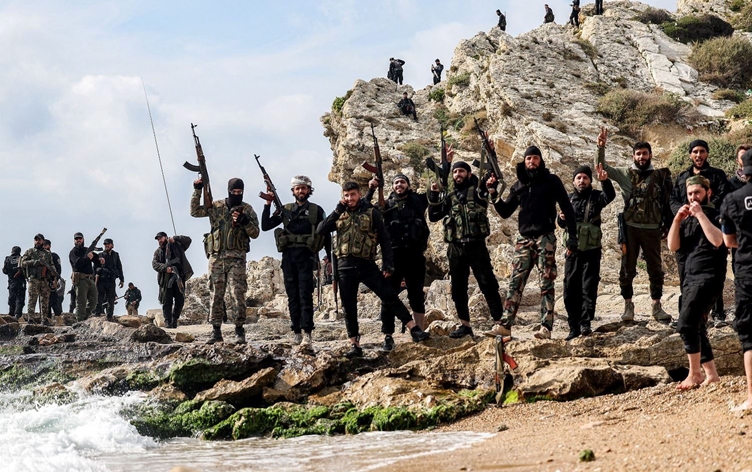
With the collapse of the Bashar al-Assad regime, the political status quo, which was carefully constructed by his late father Hafez al-Assad, also collapsed swiftly. The political and military structure, where the Alawite minority held key positions in the security forces, also included loyal Sunni forces appointed to key positions.
By Ahsan Ali
Concurrently, Syria is emerging from the ashes with the announcement of sanctions removal by US President Donald Trump and endorsements by Turkish President Recep Erdoğan, Saudi Crown Prince Mohammed bin Salman, and Qatari Emir Tamim bin Hamad Al Thani, which has reaccelerated its reintegration into regional diplomacy.
With the potential interest of every state, where the threat of YPG being dealt with by the new government in Damascus under Ahmed al-Sharaa and increasing Turkish influence, with the pursuit of Turkey’s objectives. While Saudi Arabia counterbalances Turkey and Iran in the same region, Qatar's economic interests are tied to its political leverage.
With the regional states assuming control over their benefits, the US, also welcoming Syrian President Bashar al-Assad, is seeking to advance its economic and political interests by participating in the Abraham Accords and exerting its influence in Syria. However, this move could also lead to increased tensions with other regional powers and further complicate the situation in Syria.
A few days back, French President Emmanuel Macron welcomed the Syrian President and his new government, but reminded him of the protection of minorities in Syria, as 1,700 Alawites were killed in March 2025 violence. This underscores the gravity of the situation and the urgent need to protect minority rights in Syria.
Where the former remnants of former Syrian President Assad were fighting in Latakia, Tartus, and other Alawite-dominated regions, with sporadic violence between them, the state military institution is going for extrajudicial killing, collective punishment, and massacre, with insecurity persisting. The acts where the military lacks discipline, a unified military command, and past unaddressed grievances deepening the sense of insecurity across the country.
It is crucial to acknowledge Syrian President Ahmed al-Sharaa's past affiliations with Al-Nusra Front, which operated under the blessing of Al-Qaeda and then the polished Hayat Tahrir al-Sham, which controlled Idlib.
The control over Idlib was achieved through effective governance, which provided basic supplies, maintained administrative order, and fostered state-building capacity. Still, authoritarian practices, some Islamist policies, and persistent human rights issues accompanied it.
Today, the political and military apparatus under al-Sharaa is still in its formative phases, which urgently require a robust state-building capacity to maintain the distinction between the city and the country, and to unite the state with the Kurdish Rojava state, which has come under Damascus' control after a period of significant fragmentation. Amidst these challenges still to be addressed, al-Sharaa should consider President Macron's address on protecting the minority.
Collective blame or marginalisation of the whole minority would only fan the flames of hatred and sectarian animosity. Where al-Sharaa modernises his attire and adopts some pragmatic gestures while ruling Idlib, he must ensure inclusivity, freedom, and protection for Syria's minorities, ethnicities, and religious communities.
Where Syria was mired by war since 2011, weaponising religion or sectarian politics makes things strenuous for the society that is coming out of the war and has grievances for the Assad family. Associating the Alawite minority completely is dehumanising, as many Alawites live in poverty rather than a life of luxury or “privilege”, and any generalisation can reignite repression.
Police state under Assad’s regime have faced persecution on both sides of the aisle as voices of dissent under their corrupt and autocratic rule were there from both the Sunni and Alawites. The new intelligence system, which aims to curb the influence of religiously aligned political parties and counter hate speech on social media and traditional media, plays a crucial role in maintaining social cohesion. Recently, the circulation of an old video on social media incited unrest, highlighting the fragility of Syrian social cohesion.
As President Macron raised concerns and emphasised the March 2025 massacre and sporadic targeting of Alawite civilians, the state must be secular and inclusive.
Given Syria’s rich history of multiculturalism, diverse ruling dynasties, and a layered social fabric, the emerging system nurtures inclusivity, pluralism, respect for diversity, and representation. Instrumentalisation of religion for political gains would only lead to violence in the state and provide an opportunity for the former hegemon, Iran, to reassert its position.
The power-sharing model involving Sunni Arabs, Kurds, Alawites, Druze, Christians, and other minorities should be taken into account. In the new Constitution, the president's power must be decentralised in its executive authority, enhancing local governance and reducing ethnic tensions. Excessive centralisation would be the same mistake that former Syrian President Bashar al-Assad made, who refused to reduce presidential power or adopt an inclusive power-sharing model, as demanded by domestic protesters and the UN.
With political elections tentatively pledged for 2029-30 by al-Sharaa, he should issue political decrees on banning political parties based on religious identity, which can incite violence, marginalise minorities, and foster corruption. Although al-Sharaa in Idlib did not excessively impose religious laws, he must prevent the implementation of religious laws nationwide.
The country is a diverse one and should be governed under secular law rather than Islamic Sharia law, with constitutional reform, comprehensive judicial reform, and ensuring an independent and impartial judiciary for the new Syria, with no executive interference.
As the state military apparatus is still developing, President Ahmed al-Sharaa must disband foreign military units and engage in reconciliation with former pro-regime forces, integrating Syrian forces into proper, professional, and accountable forces.
The new Syrian military should operate efficiently, avoiding inefficiency, redefining its role, and protecting borders rather than relying on personal force under al-Sharaa.
Lastly, while Turkey and several Arab states may take advantage of the new Islamist leader, Ahmed al-Sharaa, Syria must chart its own independent and balanced foreign policy. It should resist regional rivalries, overreliance on external actors, and promote neutrality and regional harmony within the state and region. This balanced approach could bring hope for a stable and peaceful future for Syria.






